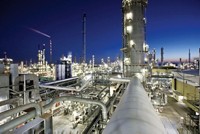Advertisement
Grab your lab coat. Let's get started
Welcome!
Welcome!
Create an account below to get 6 C&EN articles per month, receive newsletters and more - all free.
It seems this is your first time logging in online. Please enter the following information to continue.
As an ACS member you automatically get access to this site. All we need is few more details to create your reading experience.
Not you? Sign in with a different account.
Not you? Sign in with a different account.
ERROR 1
ERROR 1
ERROR 2
ERROR 2
ERROR 2
ERROR 2
ERROR 2
Password and Confirm password must match.
If you have an ACS member number, please enter it here so we can link this account to your membership. (optional)
ERROR 2
ACS values your privacy. By submitting your information, you are gaining access to C&EN and subscribing to our weekly newsletter. We use the information you provide to make your reading experience better, and we will never sell your data to third party members.
Business
BASF To Cut 3,700 Jobs
Layoffs are part of plan to integrate Ciba, which will cost $765 million by 2012
by Marc S. Reisch
July 6, 2009
BASF plans to cut as many as 3,700 jobs by 2013 as it moves to integrate Ciba, the Swiss specialty chemicals company it acquired in April for more than $5 billion. At the end of 2008, Ciba had about 12,500 employees and BASF had 97,000.
Along with the job cuts, Germany's BASF says it will take action on 23 of 55 former Ciba production sites. It will decide by March 2010 whether to restructure, sell, or close them. The firm does plan to integrate the 32 remaining Ciba production sites into its global network. In addition, BASF says it will consolidate 36 of 70 Ciba sales offices and research sites with existing BASF facilities.
The German firm projects that costs to integrate Ciba will come to nearly $210 million by the end of this year and $765 million by 2012. But BASF expects the consolidation to result in annual savings of about $420 million by the end of 2010, increasing to more than $550 million annually by 2012.
"This is unfortunately not good news for some of our employees," says BASF Chairman Jürgen Hambrecht. "But the combined businesses can be successful in the long term only if we optimize them and exploit the full potential for synergies."
The firm says it has begun talks with union representatives about the job reductions. "I promise all our employees that we will keep the period of uncertainty as short as possible and will make decisions in a fair and transparent way," Hambrecht says.
This is not the first round of job cuts advanced at BASF this year. In late April, Hambrecht said BASF would eliminate at least 2,000 positions in 2009 via plant closures and sales. At the time, the firm reported that first quarter 2009 earnings fell 64% to $573 million compared with the year-ago quarter. He also said he saw no signs of an economic turnaround.
More Latest News
October 28, 2011
Speedy Homemade-Explosive Detector
Forensic Chemistry: A new method could increase the number of explosives detected by airport screeners.
Solar Panel Makers Cry Foul
Trade: U.S. companies complain of market dumping by China.
Novartis To Cut 2,000 Jobs
Layoffs follow similar moves by Amgen, AstraZeneca.
Nations Break Impasse On Waste
Environment: Ban to halt export of hazardous waste to developing world.
New Leader For Lawrence Livermore
Penrose (Parney) Albright will direct DOE national lab.
Hair Reveals Source Of People's Exposure To Mercury
Toxic Exposure: Mercury isotopes in human hair illuminate dietary and industrial sources.
Why The Long Fat?
Cancer Biochemistry: Mass spectrometry follows the metabolism of very long fatty acids in cancer cells.





Join the conversation
Contact the reporter
Submit a Letter to the Editor for publication
Engage with us on Twitter